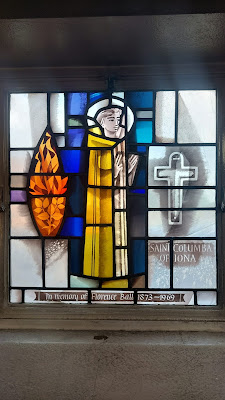Today
(21 September) the Church remembers Matthew, the tax collector who became a
follower of Jesus, and for whom the Gospel According to Matthew is named. The
Gospel reading for Holy Communion is Matthew 9:9-13, in which Matthew himself
enters the story:
‘As
Jesus was walking along, he saw a man called Matthew sitting at the tax booth;
and he said to him, ‘Follow me.’ And he got up and followed him. And as he sat
at dinner in the house, many tax-collectors and sinners came and were sitting
with him and his disciples. When the Pharisees saw this, they said to his
disciples, ‘Why does your teacher eat with tax-collectors and sinners?’ But
when he heard this, he said, ‘Those who are well have no need of a physician,
but those who are sick. Go and learn what this means, “I desire mercy, not
sacrifice.” For I have come to call not the righteous but sinners.’
There
are two treasures hidden in this account. The first concerns the tax collectors
and the Pharisees; the second concerns Jesus.
A
low-ranking tax collector such as Matthew was told how much revenue they had to
secure, with any surplus being what they themselves lived off. Tax collectors
were notoriously genius at making up taxes to increase their margin.
“Good
morning, sir. I’m going to have to ask you to unload your cart, so we can
inspect and weigh your goods and calculate the duty. While my colleague sees to
that, I just need to go through some paperwork with you. You are travelling by
road, so there’s road tax, obviously; those potholes don’t fill themselves. And
this road passes over a bridge, so that’s bridge tax. Cart tax. Your cart today
has four wheels, so that’s wheel tax, times four. And I couldn’t help but
notice that your cart has two axles.”
“Well,
yes. That’s how the wheels turn.”
“Very
good, sir. I can see that you paid attention in school. Axle tax, times two.”
“But
surely axles should be covered by the wheel tax?”
“Oh
no, sir. A wheel is a sort of a disc, on a vertical axis, whereas an axle is a
sort of a shaft or pole, on a horizontal axis. They’re two quite different
things.”
It
isn’t hard to imagine why tax collectors were unpopular. The Pharisees despised
them, considered them beyond the pale. But Jesus says to the Pharisees, “You
think that you are entirely different from the tax collectors, but you are
exactly the same. Just as they crush people under their taxation rules, so you
crush people under the rules you multiply for determining who is acceptable and
who is not. You need to look again at what it is that God asks of us:
compassion towards others, not death by a thousand cuts.”
So,
the Pharisees and the tax collectors aren’t so different after all. But Jesus comes
to both, to heal all who recognise their own sickness. He calls Matthew to
follow him, and Matthew gets up. The word Matthew uses to describe how he responds
is the same word Mark uses in his Gospel to describe Jesus risen from the dead.
In this moment—that points to that moment—Matthew comes alive. And Jesus leads
him to the table in the toll house to eat with other tax collectors. My English
translation says that they were sitting, but that is not accurate: in their
culture, they ate reclined, or lying down. Jesus is lying down and the tax
collectors, and the disciples, are lying down. And it is the same word that
Matthew uses when he recounts the angel addressing the disciples, Mary Magdalene
and the other Mary, at the tomb on the morning Jesus rose from the dead: ‘He is
not here; for he has been raised, as he said. Come, see the place where he lay.’
(Matthew 28:6). In other words, Jesus’ action in Matthew 9 points to the end of
the story, to the tomb, the house of death and resurrection. Jesus calls the
tax collectors (and the Pharisees who are the same as them, though they do not
recognise it) to die with him and rise with him. To lose the life they are
trying to build over and against others and instead to discover the life God
longs for them to know, a life characterised by compassion that embraces the
outcast.
Today
is the Feast of St Matthew. Today he invites us to join him with Jesus at the
table. To recline, and get up, and to follow Jesus to invite others to recline
and get up. Today may all that separates you from God and neighbour be put to
death. May you know the reconciliation that is already yours, in Christ, and,
through him, be empowered to extend that wealth to others.



